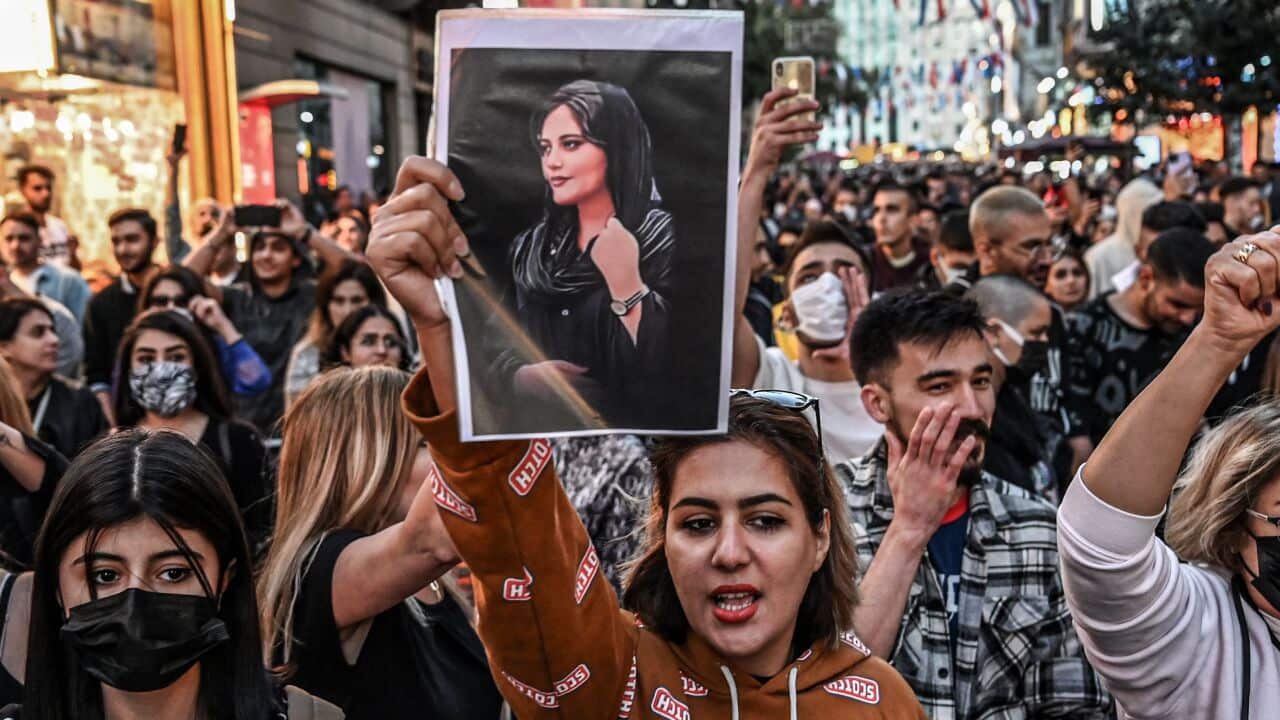KEY POINTS
- Australia has imposed further sanctions against Iran.
- It comes after the death of Mahsa Amini who died after being arrested by Iran's morality police.
- Australia has now sanctioned 31 individuals and 24 entities linked to the Islamic Revolutionary Guard Corps.
Australia has slapped further sanctions on Iranian journalists and police to mark the first anniversary of Mahsa Amini, demanding Tehran "hold those responsible" for her death to account.
Amini at the hands of Iran's morality police, having been detained for allegedly failing to comply with the country's strict hijab mandate.
Iranian authorities initially said Amini suffered a heart attack before the country's coroner later linked her death to a pre-existing medical condition.

At least 500 people have been killed during the ongoing protests. Credit: Jaap Arriens/Sipa USA
On Wednesday, Foreign Minister Penny Wong announced Australia's fourth tranche of since the demonstrations erupted, imposed on four regime-linked individuals and three entities.

Penny Wong says Australia will continue to target those who oppress Iranian civilians. Source: AAP / Dan Himbrechts
"The Australian Government will continue to take decisive and targeted action to hold Iran to account for its egregious human rights violations," she said.
"Australia stands in solidarity with the people of Iran, especially the courageous women and girls who continue to demonstrate immense bravery in the face of ongoing repression.
"We call on the Iranian Government to hold those responsible for the death of Mahsa Jina Amini to account."
At least 500 people have been killed during the ongoing protests.
Who do the sanctions target?
Two senior members of Tehran's policing apparatus will be sanctioned, along with Iran's cyber police unit and a web-hosting service that is used to conduct surveillance and restrict internet access.
Australia has also singled out Iranian media for punishment, sanctioning a state-funded broadcaster and two journalists who the federal government said "played a key role" in propagandising for the regime by broadcasting coerced confessions.
The development means Australia has now sanctioned 31 individuals and 24 entities linked to the Islamic Revolutionary Guard Corps since December.
It is the first time financial sanctions and travel bans have been imposed under the 'Iran autonomous sanctions' framework, passed in June.
The laws allow Wong to target authorities for oppressing Iranian citizens - specifically women - and "undermining good governance" in the country.
What's the human rights situation in Iran?
Wong to repeat Australia's concern about the worsening human rights situation in the country.
A month before Amini's death, Iran passed laws allowing the use of AI facial recognition technology to track women who did not wear a compulsory veil.
As the regime cracked down on the demonstrations, the Norway-based group Iran Human Rights concluded that "physical torture, sexual assault, and rape were not merely isolated incidents, but were systematically used against protesters to force false self-incriminating confessions".
At least seven men have also been executed - some publicly - since December over the protests, after what human rights groups describe as show trials designed to intimidate would-be dissidents.
That added to what a United Nations report found was a death penalty surge in 2022, with 582 executions carried out last year — a 75 per cent increase on the year prior.
Labor has taken a trenchant tone on Tehran, with Home Affairs Minister Clare O'Neil taking as the power behind a foiled foreign interference plot in Australia.
In February, O'Neil warned that anti-regime protest movements in Australia had been infiltrated by Iranian agents, saying one protestor had been surveilled and their Australian home broken into.
"We’re not going to stand back and have Australians or indeed visitors to our country, watched and tracked by foreign governments on our soil," she said at the time.











